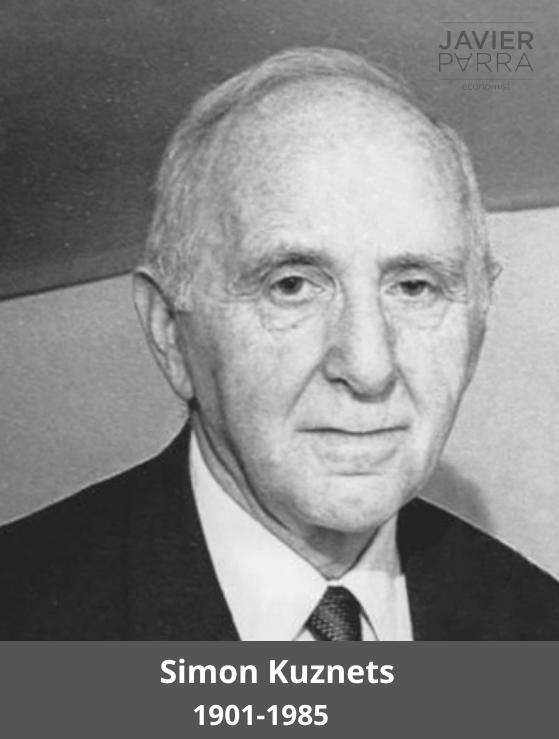Simon Kuznets, whose full name was Simon Smith Kuznets, was born in Pinks (now Belarus), near Kharkiv, Russia (now Kharkiv, Ukraine) on 30 April 1901 known for his studies on national income and its components. In 1971 he won the Nobel Prize in Economics for his “empirically grounded interpretation of economic growth, which has opened the way to a new and deeper understanding of the economic and social structure and development processes“.
Although his father indeed emigrated to the United States before the First World War, it was not until he was 21 that Simon Kuznets could join him. He began his university studies in Russia and for a time worked for the Ukrainian Bureau of Statistics. When he arrived in the United States, he enrolled at Columbia University, where, four years later, he obtained a bachelor’s, masters and doctoral degree (in 1926). His doctoral thesis dealt with “cyclical fluctuations of wholesale and retail prices”.
In his studies, he met Wesley Mitchell, founder and director of the National Bureau of Economic Research (NBER), where Kuznets was affiliated from 1927 onwards and where he remained for more than 30 years (from 1927 to 1961). Here he also met Edith, who became his wife and with whom he had two children.
His life as an academic was spent between teaching and research. He focused his work within the NBER and other public bodies (both in the United States and abroad). Of which we can highlight:
- From 1949 to 1968, he was president of the Social Science Research Council.
- From 1953 to 1963, he was chairman of the Falk Project, responsible for economic research in Israel.
- From 1961 to 1970, he was chairman of the Committee for Research on the Chinese Economy.
Teaching took him to the University of Pennsylvania from 1931 to 1954, then to Johns Hopkins University in Baltimore from 1954 to 1960 and finally to Harvard University, where he remained from 1960 to 1971 when he retired.

The work of Simon Kuznets
At the National Bureau of Economic Research (NBER), Kuznets developed his study of US national income and his work on economic time series, which resulted in his comprehensive studies of the economic growth of nations.
Before World War I, measures of Gross National Product (GNP) were approximate at best. No researcher or government institution collected data to calculate it, but Kuznets‘ work changed this. He calculated national income, breaking it down by industry, use and final product. He also measured the distribution of income between rich and poor.
The fields in which Simon Kuznets specialised were:
- Economic growth.
- Political planning theory.
- Economic development (the economics of technological change and demographic economics).
Fields in which he was not only involved in research but also teaching.
He was interested in investigating the relationship between population size, population characteristics and the process of long-term growth. This research was not limited to the United States but included intensive analysis of national income and growth data for several industrialised nations.
The development of Simon‘s saving measures, investment and consumption came about when Keynes‘ ideas on how to determine national income created a demand for such measures, so we can say that Simon acted as an accelerator for the Keynesian revolution. Not only this, but Kuznets’ measures helped to advance the study of econometrics established by Ragnar Frisch and Jan Tinbergen.
Thanks to his statistical work, Kuznets made it possible for economic science to advance in three fundamental areas:
- The long cycles theory aims to highlight the relationships and variations between the main economic indicators.
- The analysis of the causes and forms of economic growth.
- The creation of a conceptual apparatus for interpreting economic magnitudes.
Simon Kuznets also analysed the changes in the economy’s growth rate over long periods and how these were related to population growth. Indeed, Kuznets was not the only one to attempt to fill these gaps, although his meticulousness and the precision of his work have made him a fundamental reference in this respect.
It can be said, to use the words of Paul Samuelson (Nobel Prize in economics 1970), that Simon Kuznets was a passionate believer in the ultimate value of science, beyond the ideological debate that abounds in economics. For Simon, economic science was the queen of the social sciences. Kuznets was a giant of 20th-century economics. He died in Cambridge, Massachusetts, on 9 July 1985.





